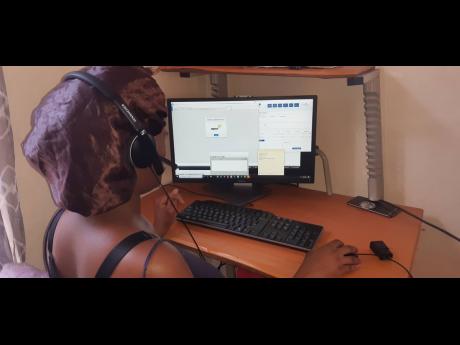Mixed views on BPO work-from-home orders
TWO WORKERS in the business process outsourcing (BPO) sector have painted very different pictures based on their experience working from home for the past two months.
Shelly-Ann Roberts*, who is eight months pregnant and works at a St Andrew company, and Nikeisha Hemmings*, a senior employee at the Alorica call centre which has accounted for Jamaica’s largest cluster of COVID-19 cases thus far, spoke with The Sunday Gleaner last week.
At 7:30 last Friday morning, Roberts had already rolled out of bed and prepared breakfast for her still-sleeping three-year-old daughter.
Half an hour later, she was at her workstation answering calls from United States-based clients in her nightgown and bonnet.
Like many BPO workers, Roberts said she is allowed two 15-minute breaks and half an hour for lunch. However, with the new set-up and a wandering three-year-old, she takes breaks whenever she desires, though still focused on meeting her quota of calls for the week.
The best part, however, is that she now works five feet from her bathroom as frequent trips down the corridor to the restroom at work had started to become taxing on her ankles and hazardous to her health.
MORE SLEEP
“It has been better than working from work because I cut down on travel time, which means I get more sleep,” said the Portmore resident.
“When I get up, I usually eat something light for breakfast and get some tea. After that, it is just work because I don’t really wake up to do anything other than that,” she explained, noting that her shift usually ends at 5 p.m.
More than 7,000 BPO workers have been laid off since the local coronavirus outbreak, and while Roberts said the call load has taken a dip in recent weeks, she is still grateful to be among those still pulling in a salary.
She said there was no outbreak at her workplace, but the entity will continue observing work-from-home protocols for another four months, although the Government’s order expires tomorrow.
DEFLATED MORALE
Life for Hemmings, however, has been difficult as her and co-workers battle stigma and a deflated morale brought on by the Alorica outbreak in March and the subsequent investigations, including a criminal probe.
“I think they have been very hard on our company with the stigmatisation. It is like we are the worst. Everyone is stigmatising us as the carriers … like we caused it,” she said, adding that efforts to work from home are being stymied by Internet-connection issues.
“It has been a challenge, and it’s not so much to get the work itself done, but it is the fight with the distractions and the interruptions in Internet and electricity [supply],” she said.
Although hundreds of Alorica staff members were ordered tested for COVID-19 following the outbreak, Hemmings told The Sunday Gleaner that she has not yet been tested.
“A lot of persons who were even tested, there were no follow-ups with them from the ministry. No visits or phone calls,” she alleged, noting that one co-worker who tested negative later turned up at hospital with flu-like symptoms.
It was at the hospital that he was confirmed COVID-19 positive.
*Names changed to protect identities.

